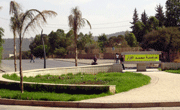| Titre : | Agents, structures and international relations : politics as ontology / | | Type de document : | texte imprimé | | Auteurs : | Colin Wight | | Editeur : | Cambridge University Press | | Année de publication : | 2006 | | Importance : | xii, 340 p. | | Présentation : | ill. | | Format : | 24 cm | | ISBN/ISSN/EAN : | 978-0-521-85752-9 | | Mots-clés : | Sociology International Relations | | Index. décimale : | 327.101 | | Résumé : | The agent-structure problem is a much discussed issue in the field of international relations. In his comprehensive 2006 analysis of this problem, Colin Wight deconstructs the accounts of structure and agency embedded within differing IR theories and, on the basis of this analysis, explores the implications of ontology - the metaphysical study of existence and reality. Wight argues that there are many gaps in IR theory that can only be understood by focusing on the ontological differences that construct the theoretical landscape. By integrating the treatment of the agent-structure problem in IR theory with that in social theory, Wight makes a positive contribution to the problem as an issue of concern to the wider human sciences. At the most fundamental level politics is concerned with competing visions of how the world is and how it should be, thus politics is ontology. |
Agents, structures and international relations : politics as ontology / [texte imprimé] / Colin Wight . - [S.l.] : Cambridge University Press, 2006 . - xii, 340 p. : ill. ; 24 cm. ISBN : 978-0-521-85752-9 | Mots-clés : | Sociology International Relations | | Index. décimale : | 327.101 | | Résumé : | The agent-structure problem is a much discussed issue in the field of international relations. In his comprehensive 2006 analysis of this problem, Colin Wight deconstructs the accounts of structure and agency embedded within differing IR theories and, on the basis of this analysis, explores the implications of ontology - the metaphysical study of existence and reality. Wight argues that there are many gaps in IR theory that can only be understood by focusing on the ontological differences that construct the theoretical landscape. By integrating the treatment of the agent-structure problem in IR theory with that in social theory, Wight makes a positive contribution to the problem as an issue of concern to the wider human sciences. At the most fundamental level politics is concerned with competing visions of how the world is and how it should be, thus politics is ontology. |
|  |


 Affiner la recherche
Affiner la rechercheAgents, structures and international relations / Colin Wight




